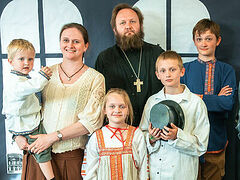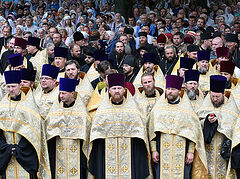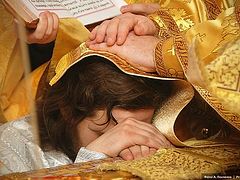In the modern West, Orthodox priests often have to work five days a week in secular work and devote only Sundays and the major feasts to pastoral service. In Russia, that is generally not the situation; however, many priests, especially in poor rural parishes, have to earn extra money. We asked a number of priests working both in Russia and abroad to express their opinions on whether a pastor should have a secular job parallel to his ministry.
Priest Nikolai Tikhonchuk, priest of the Church of the Icon of the Mother of God “Joy of All Who Sorrow” and St. Genevieve of Paris in the Korsun Diocese of the Russian Orthodox Church, and a male nurse of a Paris hospital:
 Priest Nikolai Tikhonchuk I don’t really like to use the word “must”. You can talk about why a priest works. If we develop this subject, experts on the holy canons will immediately appear, find a relevant canon for us and say: “A priest should not work!” And this is true. It would be better for a priest to be in church more often, organizing parish life and praying. But in the modern world a priest sometimes has to work. A priest has to to provide for his family, but a considerable number of communities cannot afford to give them the necessary monetary reward for their service.
Priest Nikolai Tikhonchuk I don’t really like to use the word “must”. You can talk about why a priest works. If we develop this subject, experts on the holy canons will immediately appear, find a relevant canon for us and say: “A priest should not work!” And this is true. It would be better for a priest to be in church more often, organizing parish life and praying. But in the modern world a priest sometimes has to work. A priest has to to provide for his family, but a considerable number of communities cannot afford to give them the necessary monetary reward for their service.
But in my opinion, it is useful for a priest to work. Here is the reason. I work as a male nurse and my job complements my pastoral ministry. My profession helps me to be a Christian, and my work experience enriches my practical knowledge, expanding my outlook and helping in pastoral ministry. It all depends, of course, on your profession. For personal growth it is important for a priest to have some work—if not a profession then a hobby for his multifaceted development. When I arrived in France, I discovered an interesting thing. When people meet, they talk not about money, expensive cars and mansions, but about what they really do, what they are interested in and what they live by professionally. It was an amazing discovery! A profession is what reveals our talents, where we grow and learn, and what inspires us in life. It is not just about making money.
“There should be no obligation in this matter”
Archpriest Alexander Dyachenko, rector of the Church of the Tikhvin Icon of the Mother of God in the village of Ivanovo, Alexandrov diocese (Vladimir region), and diocesan missionary:
 Archpriest Alexander Dyachenko There should be no obligation in this matter. It all depends. In big cities, where churches are able to support clergy financially, this problem may not exist at all. But in villages where there are very few parishioners, it often exists.
Archpriest Alexander Dyachenko There should be no obligation in this matter. It all depends. In big cities, where churches are able to support clergy financially, this problem may not exist at all. But in villages where there are very few parishioners, it often exists.
Our times are characterized by a crisis of vocation. Fewer young people want to become priests. Therefore, people who are not very young, who are well-established and have a permanent source of income should be called to the priesthood. They can work secular jobs and serve in church. Those who agree to such a path are undoubtedly heroes. You can rely on them.
Retirees should be invited to the priesthood. In my opinion, in order for rural churches to not lose existing communities due to a shortage of priests, candidates could be ordained without seminary education, from among the locals, if they are believers and respected.
Working without impediment for the most important thing—the Divine Liturgy
Archpriest George Zavershinsky, head of the Deanery of Scotland and Northern Ireland of the Diocese of Sourozh, a Ph.D. in Philosophy and Technical Science, Master of Theology, and member of the Russian Writers’ Union:
 Archpriest George Zavershinsky A priest can work if it does not interfere with the most important work to which he has dedicated his life—celebrating the Divine Liturgy. We know that the Apostle Paul was tents so as not to be beholden to anyone, but rather to earn his own bread. Some priests follow the same path and can provide themselves and their families with what they earn in a secular job. I repeat, this should not prevent a priest from fulfilling his duties—to administer the Holy Mysteries of Christ.
Archpriest George Zavershinsky A priest can work if it does not interfere with the most important work to which he has dedicated his life—celebrating the Divine Liturgy. We know that the Apostle Paul was tents so as not to be beholden to anyone, but rather to earn his own bread. Some priests follow the same path and can provide themselves and their families with what they earn in a secular job. I repeat, this should not prevent a priest from fulfilling his duties—to administer the Holy Mysteries of Christ.
In his time, before training a candidate for ordination to the priesthood Metropolitan Anthony of Sourozh waited a long enough time for him to study and find a worthy place to provide for himself and his family, and only then did Vladyka gradually guide him to ordination. Archimandrite Sophrony (Sakharov) acted in a similar way in the monastery he founded. He accepted into his community only those who were experienced and sufficiently educated, and therefore understood this life and could answer the numerous questions of those who visited the monastery.
Material need: a spiritual temptation or a spiritual labor?
Priest Leonid Kudryachov, Orenburg, the Church of the Annunciation of the Most Holy Theotokos, head of the Orenburg Diocese’s press service:
 Priest Leonid Kudryachov Instead of an abstract answer I propose several possible options for consideration.
Priest Leonid Kudryachov Instead of an abstract answer I propose several possible options for consideration.
A hopeless—in the financial sense—parish. This was verified by several priests who previously served in it. What is the next priest supposed to do? To live from hand to mouth for six months to a year, and then ask for a transfer to another parish? Or get a secular job and try to combine his two vocations? Will this compromise lead to a better situation in the parish than the constant change of rectors? If you don’t try, you won’t know.
A hopeless—again in a financial sense—parish. At least it seemed so to the previous rector. He had a secular job, and served on Sundays and the major feasts. Several old women attended services—what could he expect from them? But when another priest came to take his place, he decided to devote all his time to nourishing the flock spiritually. He organized educational courses for adults, opened a Sunday school, worked with young people, paid regular visits to the local hospital, and tried to say a useful and edifying word everywhere. He prepared for the Sunday sermon very carefully throughout the week. At first people viewed him as an eccentric, fanatic, even a sectarian, but then more and more people began to come to the services, and the parish was revived and flourished. Could this priest have brought about such a change by combining the pastoral ministry with secular earnings? Unlikely.
A parish without financial problems, thanks to its convenient location. It doesn’t matter if there are parishioners at the services or not. The main thing is that during the day the church is not empty—let someone come in, light a candle, and leave a prayer list. The priest and his family have enough to live on, but this material stability has a negative effect on him. Over time, he begins to view his church activities as a boring routine. He wants more movement, more self-fulfillment. He begins to complain that he is burning out. And now the priest finds himself in a secular field, mastering programming, beekeeping, or something else. You can understand that it doesn’t befit him to do this.
But what if the priest is not a rector, only an ordinary clergyman in a large parish? In such a case, his salary may not correlate at all with the amount of his pastoral efforts. What if the rector is doing well in material terms, while the other priests are doing so-so? Should they earn money on the side? Perhaps...
How can you give simple answers to such questions when life is so complex and varied? There are priests’ families with many children, with one child, or childless. A priest may be young, smiling and full of energy, or he may be aged or suffer from chronic diseases. One turns to secular work from material need, another—from a spiritual temptation, another—as a spiritual labor. Only God knows who is who.
“Priests working in the world bear a heavy cross”
Archpriest Gabriel Makarov, Dean of the St. Nicholas Cathedral of the Russian Orthodox Church Outside of Russia in Brisbane (Australia):
 Archpriest Gabriel Makarov If a priest has to work in the world, then undoubtedly this situation is to the detriment of his parish. Especially when the priest has to care too much about the material support of his household.
Archpriest Gabriel Makarov If a priest has to work in the world, then undoubtedly this situation is to the detriment of his parish. Especially when the priest has to care too much about the material support of his household.
But outside Russia, not all parishes are able to fully support their priests, not to mention other members of the clergy, and they try as best they can. Priests working in the world bear a heavy cross and deserve their parishioners’ respect!
Working priests are nothing new
Priest Alexei Guglivaty, rector of Edinoverie communities in the town of Kurovskoye, the villages of Avsyunino and Mistsevo near Moscow:
 Priest Alexei Guglivaty A priest can combine secular work with his ministry, if this does not interfere with his liturgical and preaching activities, and pastoring his parish and spiritual children. I think that he not only can, but also should work. Now we see that during the pandemic parishes often have a low attendance, unlike in past times. We do not know how long the pandemic will last. Unfortunately, people sometimes fear that after the expected victory other diseases will appear and threaten our lives, which until recently was so peaceful.
Priest Alexei Guglivaty A priest can combine secular work with his ministry, if this does not interfere with his liturgical and preaching activities, and pastoring his parish and spiritual children. I think that he not only can, but also should work. Now we see that during the pandemic parishes often have a low attendance, unlike in past times. We do not know how long the pandemic will last. Unfortunately, people sometimes fear that after the expected victory other diseases will appear and threaten our lives, which until recently was so peaceful.
Of course, under these conditions of quarantines and lockdowns we see how our parishes and communities are declining. This leaves an imprint on the parish activities and the financial component of the community. Many clergymen, especially from rural areas, are in need. But they need to take care of their parishioners, churches... There are many different issues. Therefore, in our modern conditions a clergyman’s additional earnings are not only possible but perhaps necessary.
There is a saying: all new things are well-forgotten old things. If a priest works on an equal basis with parishioners, this is not an innovation, but an opportunity that existed before the Revolution1 and still exists abroad—for example, in Europe. It is quite possible that such a need will arise in Russia too, “thanks” to the pandemic.
Service is a total commitment to Christ
Priest Valery Dukhanin, cleric of the Church of St. Pimen at the St. Nicholas-Ugresh Theological Seminary (Dzerzhinsky, near Moscow) and Doctor of Theology:
 Priest Valery Dukhanin A priest who goes to a secular job risks very much. It’s like an officer who appears in his military unit to serve on weekends, but works the other five days a week in a secular job. Combat efficiency will gradually be lost; a military bearing, readiness for real military action, and military affairs proper will be pushed to the sidelines. And he will be more of a foreman, engineer, or merchant—whatever he has become in his secular job. This is even more applicable to priest. Service is a total commitment. As soon as the Lord called the apostles, they left everything and followed Him. It didn’t matter if they had a means of livelihood or not—they just followed Christ and devoted themselves to service. And He did not abandom them.
Priest Valery Dukhanin A priest who goes to a secular job risks very much. It’s like an officer who appears in his military unit to serve on weekends, but works the other five days a week in a secular job. Combat efficiency will gradually be lost; a military bearing, readiness for real military action, and military affairs proper will be pushed to the sidelines. And he will be more of a foreman, engineer, or merchant—whatever he has become in his secular job. This is even more applicable to priest. Service is a total commitment. As soon as the Lord called the apostles, they left everything and followed Him. It didn’t matter if they had a means of livelihood or not—they just followed Christ and devoted themselves to service. And He did not abandom them.
To justify themselves people usually refer to the experience of Western countries, where priests have to work five days a week in secular work and serve only on weekends. But in their case we are talking about survival. This is better than nothing. It would be good for our country to not fall into such a practice as long it’s as possible to refrain.
It’s also about the resources of the human body. Imagine that a priest has worked in his secular job for five days. And on Saturday and Sunday he serves in church, hears confessions, delivers a sermon (which he prepares in advance), talks with parishioners, baptizes, marries, sings, probably teaches at the Sunday school, and goes to give Unction to the sick. And on Monday morning he goes again to his secular work. Seven days of labor without rest. My personal experience is that non-stop work with few hours of sleep leads to such a sapping of your health that you end up incapacitated, and it takes years to recover.
A layman coming to church services on weekends is one thing, and a priest who pushes himself to the limit is another. It is a disaster if on Sunday, apart from the Liturgy, there are no services of need, no sacraments, no conversations, no sermons, and no Sunday school,.
People also refer to St. Luke (Voino-Yasenetsky). This example is an exception. Few can be such spiritual giants who can cope with workloads both here and there. If our bishops, instead of ruling their dioceses, were to work secular jobs, the dioceses would quickly collapse.
Nevertheless, I too know some clergymen who were allowed to work in the world to earn extra money. Where they serve, the means are extremely meager. We cannot judge them. Some of the priests may be blessed to work in a responsible public office. This should be taken as obedience. But such cases are still an exception.
The world is always the world, with all its peculiarities, temptations and secular spirit. Therefore, for a priest to go to work in the world is at least a risk, and at the most the beginning of the loss of the priesthood. You have already left the world to serve God in the Church—why are you going back? Thus, in general a priest should not labor in a secular job.
Contrary to the prevailing opinion, our compatriots are now hungry for a spiritual word, for a conversation with a priest... And they write to you in social media, ask for advice, want to meet with you in order to solve their spiritual problems—and you no longer have time not only to answer, but even to read their letters. There are few priests, they are overwhelmed with work, and people crave communication with a priest. If we say to them: “Sorry, we have gone to work in the world,” who are we after that?





